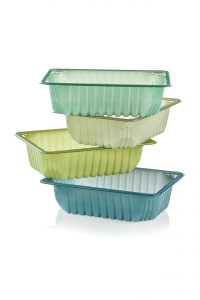AGQPE has been supplying CPET trays to the South African market for the past 25 years. Founder Amotz Golan attributes their longevity and popularity to five properties: high barrier, rigidity and strength, ease of operation, appearance and cost. In the first instance, CPET forms a highly effective barrier against oxygen, water, carbon dioxide and nitrogen, which helps reduce the risk of contamination, improves the food’s quality and extends its shelf life.
The second beneficial property is outstanding resilience, thanks to CPET’s high impact strength and rigidity, even at low temperatures. The low stacking height simplifies handling and allows for weight-bearing loads and safe transportation and storage.
In the third instance, ease of operation for the packer is guaranteed via excellent tray uniformity and conformity, thanks to market-leading low variances in cut positions and tolerances. These result in smooth and reliable denesting for an uninterrupted production flow.
The fourth benefit is an attractive appearance that grabs consumers’ attention at the point of purchase. With countless standard shapes, textures, dual colour variants, embossing effects and lidding options, each CPET tray’s packaging design can be customised to match a brand’s specific messaging and value proposition needs.
Amotz emphasises that these benefits are matched by the cost. ‘CPET trays will successfully hold their own when competing against similar products.’

Circular economy design
The composition of CPET trays has also changed to keep up with sustainability developments that are in line with circular economy principles. The Faerch Group, the biggest European manufacturer of CPET trays with two production facilities and 16 distribution centres across the region, has embraced circular production by incorporating recycled PET items into its CPET ready meal tray manufacturing.
CEO Lars Gade explains that the ‘circular economy’ way of making food packaging starts with collecting PET material that is recycled back into new food-grade packaging in an endless number of cycles. Faerch’s commitment to this process is made possible by the group’s integrated recycling of post-consumer food trays at its first 4PET facility in The Netherlands via a buyback programme from collectors, sorters and customers across Europe. The plants can recycle 1.2-billion mono-material PET trays annually, resulting in flakes and pellets ready to be processed into food-grade packaging. The group’s annual target is using more than 100 000 tons of post-consumer recycled (PCR) material in its CPET trays.
The group has branded its next generation of trays that consists of an 80% blend of PCR PET bottles and trays, without additional colours mixed in, as EVOLVE.
AGQPE first introduced CPET trays to SA in 1996 for packing Woolworths’ macaroni and cheese. At the time, it represented MCP Performance Plastic, the Israeli manufacturer of CPET trays. MCP trays have become known as On-Tray in the local market. In 2001, AGQPE became Faerch’s representative in SA. ‘This partnership’s success keeps growing steadily because AGQPE supports local customers with a complete basket offering that includes fit-for-purpose sealing film and sealing machines to combine the CPET trays and lidding materials,’ Amotz reports.
He adds that the Faerch Group’s EVOLVE CPET trays, made with recycled content, are used extensively by catering companies, butcheries, deli stores and retailers such as Woolworths and Spar to package frozen meals, modified atmosphere packaged (MAP) prepared foods and MAP meats.
Last month, Faerch announced its acquisition of MCP, pending regulatory approval, as a stepping stone for entering the $55-billion US market and realising its long-term goal of making circular food packaging available in additional markets.
‘This partnership will set the companies up at the joint forefront of circular economy food packaging in supporting retailers, brand owners and food manufacturers to make the right sustainable material choices,’ Amotz notes. ‘It also means that AGQPE will soon be able to supply both partners’ products under one banner. This will add further value to the South African ready meal and meat industry and help keep brands at the forefront of the sustainability evolution.’
Click here to read this article in the E-mag




![02 GSW WideFormat [2]](https://www.packagingmag.co.za/wp-content/uploads/2024/11/thumbs/epic-350x250/02_GSW-WideFormat-2-350x250.jpg)
![Canon Colorado [1] ED](https://www.packagingmag.co.za/wp-content/uploads/2024/11/thumbs/epic-350x250/Canon-Colorado-1-ED-350x250.jpg)



